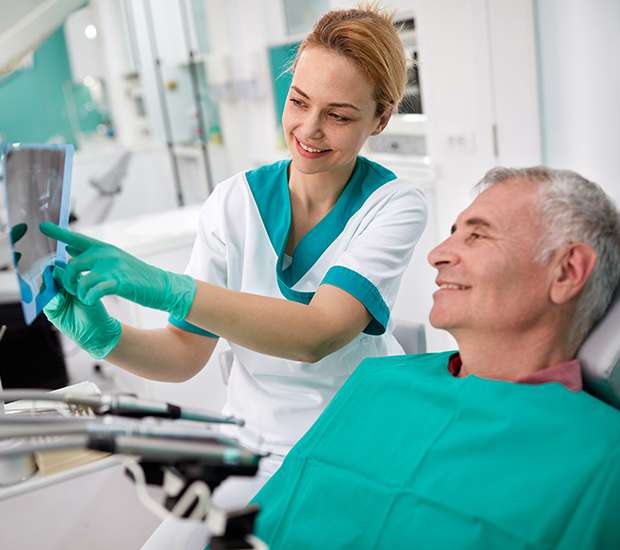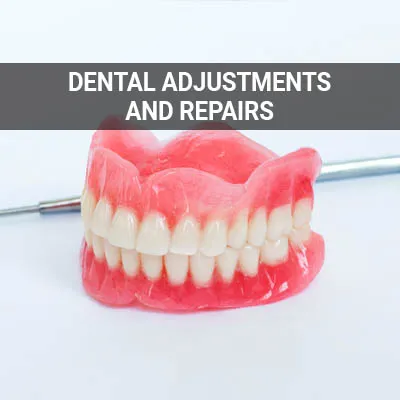Solutions for Common Denture Problems Livermore, CA
Getting dentures for the first time can be exciting. As with any new undertaking, however, affected individuals must undergo a certain period of adjustment. Solutions for common denture problems usually start with preparation and prevention.
Solutions for common denture problems are available at Livermore Dental Spa in Livermore and the surrounding area. Our friendly and knowledgeable staff is always ready to help those with dentures adjust to their new teeth. We offer full-service follow-up care, including ongoing fittings and denture adjustments.
Preventive care is critical, and our focus as the first line of defense against potential problems. Proper preventive care can help prevent many denture-related issues like mouth sores, infection, and thrush. Other common issues that we help troubleshoot can include difficulty eating and speaking with new dentures. Call us today at (925) 344-3993 to make an appointment.
What to Expect With Dentures
Getting dentures for the first time will result in large lifestyle changes. Denture wearers should expect diet changes and discomfort at first. These appliances are not as efficient at chewing as natural teeth and can cover the palate, which plays an important role in sensing flavors. This causes many denture wearers to gravitate towards more processed foods that are also naturally higher in fat, salt, and sugar. We recommend denture wearers eat a diet rich in protein, carbohydrates, and healthy fats.
When wearing dentures for the first time, it is normal to experience some soreness and discomfort. The University of Iowa's College of Dentistry and Dental Clinics states that it is not unusual for dentures to be relined or remade within six to eight weeks after tooth extraction. This will occur as the mouth muscles adjust and get used to the appliance. As people get used to their dentures, pain and discomfort will disappear, and they can resume their normal activities comfortably.
“Getting dentures for the first time will result in large lifestyle changes.”
Seeking Treatment When Problems Arise
It is crucial to seek treatment quickly when problems with dentures arise. Common denture problems include gum and mouth irritation, loose dentures, and mouth infections. Simply ensuring that dentures fit correctly can increase comfort and reduce soreness.
If a denture problem is present, contact our team quickly. The dentures may need to be adjusted or replaced. Denture wearers who do not seek treatment for ill-fitting dentures can develop mouth infections such as cheilitis and stomatitis. Seeking medical treatment when the problem first arises can prevent such complications from arising.
“It is crucial to seek treatment quickly when problems with dentures arise.”
How To Travel with Dentures
Traveling with dentures for the first time, especially overnight, can be nerve-racking. An effective way to cope with denture-related anxiety and have a successful trip is to prepare well ahead of time. In addition to having practiced the proper denture-care routine at home, the patient should:
- Research the destination’s water quality. If local water is questionable, patients can soak dentures in bottled water for the trip duration. An article from the Centers for Disease Control and Prevention recommends choosing bottled water that has been treated for Cryptosporidium when traveling.
- Choose an appropriate denture case. A tight-fitting case protects dentures from bumps along the way. This prevents cracks, which could harbor bacteria. Some travel cases for dentures include brushes and mirrors for convenience.
- Consider investing in a second set of dentures. Although not necessary for most people, a set of backup dentures may occasionally save the day. For example, if the denture-wearer is traveling for a meeting or speaking engagement, having a second set of dentures may provide peace of mind. The same goes for a patient on an extended trip.
“An effective way to cope with denture-related anxiety and have a successful trip is to prepare well ahead of time.”
Check out what others are saying about our dental services on Yelp: Solutions for Common Denture Problems in Livermore, CA
Precautions With Food
When wearing new dentures, it is a good idea to eat soft foods and take small bites. Chew slowly and try to use both sides of the mouth so the jaw muscles can get a firm hold. Alternatively, some people decide to use denture adhesive for extra stability. We recommend avoiding hard, hot, tough, or sticky foods to minimize potential teeth damage.
Hot foods can cause problems initially because the lower temperature sensitivity increases the risk of accidental burns. Once patients get used to the difference, they can start introducing hot foods to their diet again. Avoid foods like hard vegetables, seeds, and nuts that can damage dentures and refrain from chewing gum, peanut butter, and other sticky foods that make it more difficult to clean dentures.
“When wearing new dentures, it is a good idea to eat soft foods and take small bites.”
Questions Answered on This Page
Q. What should people expect when getting dentures?
Q. When should denture wearers seek treatment when a problem arises?
Q. What food should denture wearers eat?
Q. Are dentures associated with oropharyngeal cancer?
Q. What is the best way to travel with dentures?
People Also Ask
Q. What is the proper way to take care of my dentures?
Q. What should I do if my dentures start to feel uncomfortable?
Q. How should new denture wearers change their eating practices?
Q. What lifestyle changes will people experience after getting dentures?
Q. What is the importance of seeing a dentist for denture repair?
Checking for Oropharyngeal Cancer
Dentures do not cause oropharyngeal cancer, but dentures that do not fit well or poor oral care while wearing them can. The irritation, inflammation, and infection associated with such issues have been associated with oral cancer. According to one study, while ill-fitting dentures are a risk factor for oral cancer development, there is no link between denture use duration and cancer development.
To limit the risk of oral cancer, people should have their dentures checked. Properly fitting dentures reduce the risk of infection or inflammation. All denture wearers should also take their dentures out every night and clean them well.
“Dentures do not cause oropharyngeal cancer, but dentures that do not fit well or poor oral care while wearing them can.”
Frequently Asked Questions
Q. Is it easy to chew when wearing dentures?
A. Dentures restore part of a person's chewing capacity compared with having no teeth. However, a denture-wearer will not have the biting force of a person with a complete set of healthy, natural teeth. Chewing with dentures can be mastered with practice.
Q. How can I learn to speak clearly while wearing dentures?
A. Learning to speak clearly with dentures requires practice. It may take a few weeks, but it does get easier. For example, reading aloud is an effective way to practice. Speaking more slowly may also help a patient learn to enunciate while wearing dentures.
Q. What can I eat with dentures?
A. Foods that are not sticky or hard are usually preferred for denture-wearers. It is a good idea to avoid foods with small seeds or hard bits. Foods that have been cut into small pieces are easiest for a person with dentures to eat.
Q. How do I keep my dentures clean?
A. To keep a pair of dentures clean, brush them with a soft-bristled toothbrush at least once a day. It also helps to rinse them after eating. Soak them overnight in an appropriate solution to make sure they keep their shape.
Q. Where can I find more solutions for common denture problems?
A. The most reliable source of information about denture care and oral health is a dental professional such as Livermore Dental Spa. If a patient experiences a problem with dentures, it may be an indication that it is time to visit the dentist. Always bring up any concerns and issues during an appointment.
Denture Terminology
Call Us Today
Taking the right precautions and actions can combat common denture problems. Our team at Livermore Dental Spa can help. Call us at 925-344-3993 for more information or to schedule an appointment.
Helpful Related Links
- American Dental Association (ADA). Glossary of Dental Clinical Terms. 2024
- American Academy of Cosmetic Dentistry® (AACD). Home Page. 2024
- WebMD. WebMD’s Oral Care Guide. 2024
About our business, license, and website security
- Livermore Dental Spa was established in 2023.
- We accept the following payment methods: American Express, Cash, Discover, MasterCard, and Visa
- We serve patients from the following counties: Alameda County, Contra Costa County and San Joaquin County
- We serve patients from the following cities: Livermore, Alameda, Pleasanton, Dublin, Ulmar, Tracy, San Ramon, Danville, Mountain House and Castro Valley
- CA (License #101519). View License Information and Specifics
- National Provider Identifier Database (1679095681). View NPI Registry Information
- Healthgrades. View Background Information and Reviews
- Norton Safe Web. View Details
- Trend Micro Site Safety Center. View Details
Back to top of Solutions for Common Denture Problems











